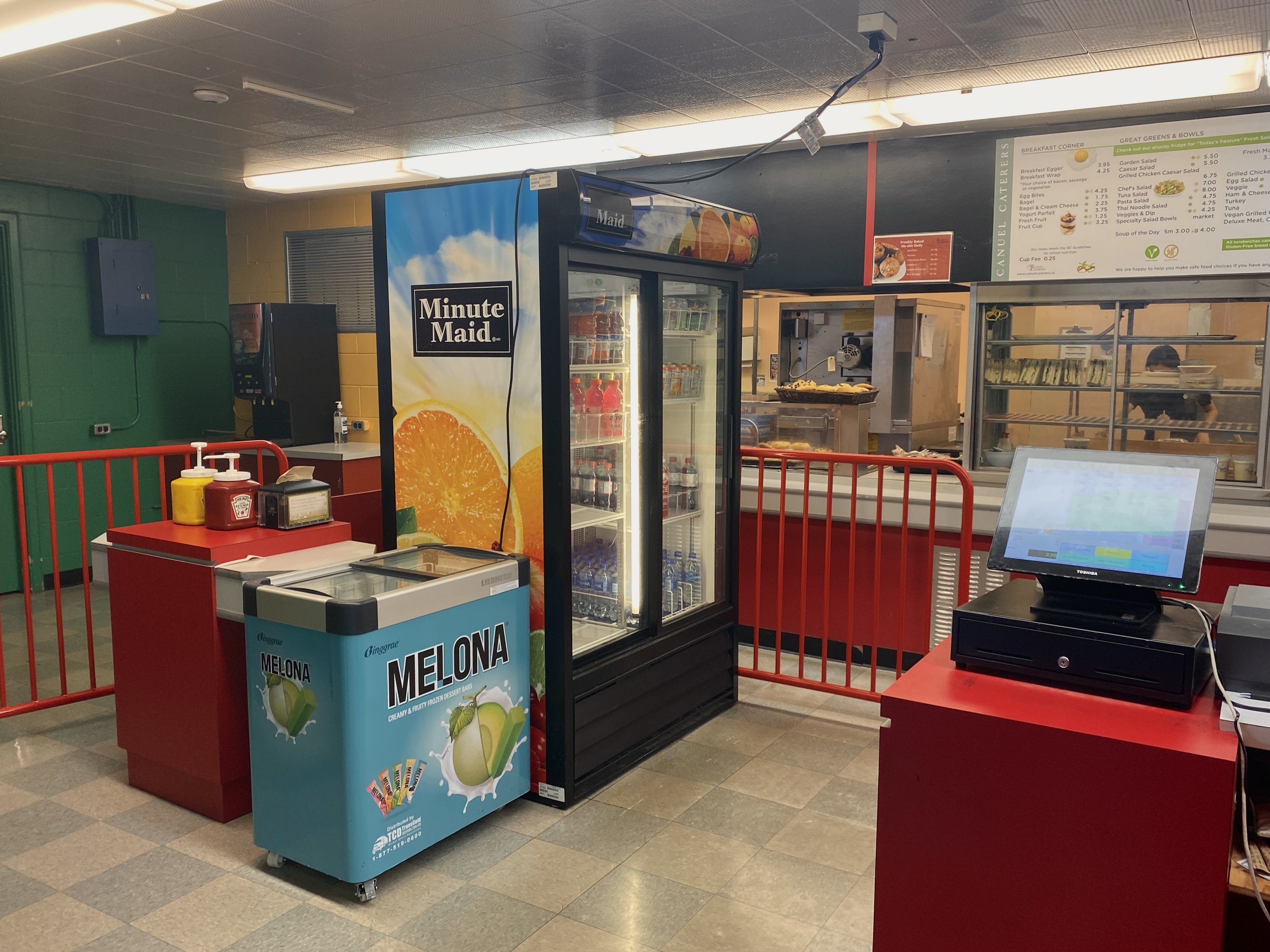EDITORIAL | BC’s Food Guidelines Aren’t On the Menu For Hamber’s Cafeteria
Students wishing to purchase cafeteria food at Eric Hamber often find themselves in a queue stretching across the cafeteria and lasting throughout much of the lunch period. However, there currently is no way for students to know which options are available that day without reaching the front of the line and entering the food service. For students with dietary restrictions, this may mean waiting in line only to find they can’t eat anything offered and will have to go hungry. The cafeteria is a hot-button topic of discussion amongst many lunch groups in the school, with students often questioning the options or lamenting the lack of choice. But how does Hamber’s cafeteria work, and who decides what gets served?
The Main Players
At Eric Hamber, the cafeteria is serviced by Canuel Caterers, as per a contract with the Vancouver School District. The vending machines are serviced by VendMaster Services. The Vancouver School District, like all school districts in BC, is expected to follow provincial guidelines for what is allowed to be sold in schools, outlined in the Guidelines for Food and Beverage Sales in B.C. Schools. However, these guidelines are not enforced by any provincial authority.
The Vancouver School Board
The VSB has committed to following the guidelines set by the provincial government. In the 2022 VSB Food Framework, a planning document for VSB school policy, one of the goals stated is: “Offering a variety of healthy foods: follow a meal plan that provides a wide range of foods that meet the B.C. School Food Guidelines.”
The Food Services department of the VSB was unable to respond to The Griffins’ Nest’s request for comment in time for the print release of this investigation.
In 2022, The Nest sent out a Freedom of Information (FOI) request to the VSB inquiring about the food and drink items sold in VSB secondary school cafeterias, as well as the nutritional content associated with each freshly-prepared food item. Additionally, a second FOI was sent out asking for a list of food and drinks sold in VSB secondary school vending machines.
The VSB’s Freedom of Information and Privacy Compliance department responded to the first request stating that “a centralized list/record of food and drink items sold in VSB secondary school cafeterias, along with the associated nutritional information, does not exist.”
They added that “each cafeteria [...] operates autonomously following the Guidelines for Food and Beverage Sales in B.C. Schools,” and furthermore, that “the VSB’s agreement with its supplier references that supplies must also adhere to the aforementioned guidelines.”
The VSB responded to the request for the vending machine items similarly, stating that a centralized list of food and drink items sold in VSB vending machines does not exist either, and that “each vendor contracted by the VSB is asked to adhere to the Guidelines for Food and Beverage Sales in B.C. Schools”.
The Guidelines for Food and Beverage Sales in B.C. Schools
These provincial guidelines are, on paper, simply guidelines, as they are not enforced in any way. However, many school districts claim to follow them. They were most recently revised in 2013, with a new version in the works as of last year, and apply to food and beverages being sold in any way in BC schools. This includes fundraisers by students and staff for organizations such as clubs and sports teams.
The guidelines score freshly-made food, like cafeteria food, as either “sell” or “do not sell”. In order to determine whether freshly-made food can be sold or not, each item must pass a checklist about its nutritional content. Food items are separated into different categories, such as “Grain Dishes and Baked Goods” and “Salads, Vegetables, and Fruit Dishes”. For each category, there are eight requirements to meet regarding the nutritional content of the food, and if any of these requirements are not met, the item is marked as “do not sell”.
Prepackaged food, in contrast, is marked as “sell most”, “sell sometimes”, or “do not sell”. These indicators are given based on whether or not the product meets certain markers for various nutritional aspects of the product, such as fat, sodium, and sugar levels. Like freshly-made food, prepackaged goods are also separated into multiple categories with different guidelines. For example, the category for prepackaged beverages indicates that a maximum of 15 mg of caffeine is permitted, and that if a caffeine-containing beverage does not indicate the amount of caffeine in it, it should not be sold.
Canuel Caterers
Canuel Caterers is a BC-owned and operated catering company based out of Surrey. They state on their website that they “provide both in-house cafeteria services and student meal programs in the Lower Mainland and the Kamloops Thompson River area of British Columbia”.
In an emailed statement to The Nest, Canuel Caterers said that their decision-making process regarding menu items is from customer feedback. They said, “We have been in business for 30 years and with 52 locations we develop menus based on the food and beverage guidelines and feedback from our clients.”
Canuel Caterers also told The Nest in the same emailed statement that, “Before the provincial government set nutritional standards for food service providers in the educational market, Canuel Caterers partnered with a registered Dietitian to revise its menu and ensure a plethora of healthy choices for both breakfast and lunch selections.”
In the email to The Nest, Canuel Caterers provided a menu, which is the same as the one posted in Hamber’s cafeteria. This menu includes many healthy options such as a “Superfood Salad”, “Vegan Grilled Cheese”, and “Buffalo Quinoa Bowl”, but does not list many of the options found daily at Hamber, such as chicken strips and fries or burgers.
When members of the Editorial Board attempted to purchase the aforementioned menu items as a part of this investigation, which are listed as daily vegetarian and vegan options, they were told these items were not available that day because they were not made.
One of the prepackaged drinks sold in the cafeteria by Canuel Caterers is a 591mL size Diet Pepsi in wild cherry flavour, which contains 71 mg of caffeine, almost three times the permitted amount; under the provincial guidelines, it should not be sold.
Another drink offered at Hamber’s cafeteria, Diet Dr. Pepper, lists ‘caffeine’ as an ingredient but does not indicate the amount of caffeine. This product should also not be sold as per the provincial guidelines.
The Hamber Administration
The administration at Hamber does not appear to play a big role in the decisions about what is served at Hamber.
In their emailed statement, Canuel Caterers said that the Hamber administration is not directly part of the decision-making process surrounding menu items, but the company is “always open to discussion and ideas”.
Hamber Principal Ms. M. Jensen confirmed this with The Nest, stating that “our school district office holds a contract with both the vending machine company and Canuel Catering for the food that’s served and the beverages that are sold in both Hamber’s vending machines and the cafeteria.”
The administration acts as a go-between for the Food Services department at the VSB, the independent contractors, and the students at Hamber. According to Ms. Jensen, unique dietary accommodations may be brought to her attention, and she can relay that information to the district or the contractors.
She told The Nest that “where we have very unique [dietary] requests, it might be something that I work directly with the food service provider and our working relationship here at the school, or it might be something that I give as feedback to the school board office.”
The situation is similar regarding complaints or feedback about the food provided at Hamber. Ms. Jensen stated: “Hamber administration would have students who come to see us if they have questions about the food that's being sold. Over the years I've had questions about [whether there could] be more meatless options in the cafeteria, and the catering company has worked with the school in the past to provide more meatless options.”
The administration has also worked with students about feedback regarding the pricing of menu items and the availability of “everyday options” as they compare to “options that students would have if they went to a local restaurant or food trucks or food delivery”, according to Ms. Jensen.
Nutrition Facts Fall Through The Cracks
There is an apparent lack of communication between the parties involved in determining the food sold in secondary schools. The VSB claims that each cafeteria is run independently, and thus they are unsure of the nutrition facts of the food items; meanwhile, Hamber administration claims that the school district holds the contract with the catering company, and thus, they are also unaware of the nutritional content of cafeteria food. Canuel Caterers agrees that Hamber administration are not involved in the decision-making process, and claim that they follow the guidelines that the VSB has given them.
The lack of accountability on all three sides is the cause of a major communication problem when it comes to the nutrition facts of cafeteria food. Unfortunately, it’s the students who must deal with the consequences of this issue, especially those who have special dietary needs.
The Editorial Board believes that there should be more open communication between the cafeteria and the student body regarding options, especially if menu accommodations for dietary restrictions aren’t readily available at all times. If the cafeteria were to maintain a standard menu rotation and made that schedule accessible to students, possibly through PA announcements or even a sign outside the cafeteria, it would make it much easier for students with dietary restrictions to plan accordingly. Although student feedback is received through sales, formal student communication through surveys could ensure the menu items that students want are prioritized and encourage more students to eat at the cafeteria, knowing their favourite menu items will be available.
It is also important that if students and staff are expected to uphold the Guidelines for Food and Beverage Sales in B.C. Schools in their fundraising attempts for sports teams and clubs, Canuel Caterers and VendMaster should also be held accountable to follow them.
It is paramount that cafeterias are transparent about what options really are available. All students have a right to know what’s in the food they eat, and be given the opportunity to make healthy decisions for themselves. Students with dietary restrictions should not have to worry about going hungry because there aren’t appropriate options for them at school.


